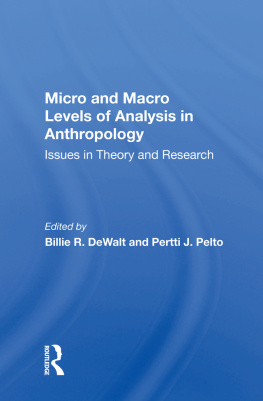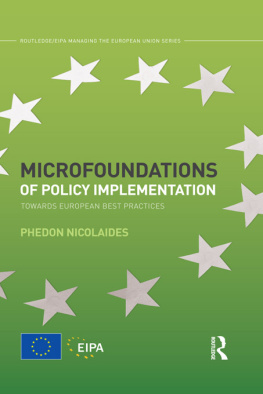Micro-Macro Links and Microfoundations in Sociology
Micro-Macro Links and Microfoundations in Sociology focuses on two main issues in sociology. First, how macro-conditions can explain macro-outcomes mediated by actor behavior at the micro-level (micro-macro links). Second, how alternative micro-models affect macro-outcomes (microfoundations). The contributions reflect key features of micro-macro modeling in sociology as well as recent progress in this field. The chapters address core features of explanations of social phenomena using micro-macro models, the problem of cooperation, heterogeneity of actors, structural balance, opinion formation, segregation, and problems of micro-macro models that are based on rational choice assumptions. Moreover, the contributions show how different research methods can be applied fruitfully, such as laboratory experiments, equilibrium analysis, and agent-based modeling.
As a result, the book can be a guide for graduate students who want to develop their skills in building micro-macro models. In addition, the book provides specialists of the different substantive research areas with up-to-date new developments in their research area.
This book was originally published as a special issue of the Journal of Mathematical Sociology.
Vincent Buskens is Professor of Theoretical Sociology at the Department of Sociology/ICS, Utrecht University, The Netherlands and Professor of Empirical Legal Studies at the Erasmus School of Law, Erasmus University Rotterdam, The Netherlands. His main research areas are theoretical sociology, game theory, social networks, mathematical sociology, methods of empirical social science research.
Werner Raub is Professor of Theoretical Sociology at the Department of Sociology/ICS, Utrecht University, The Netherlands. His main research areas are theoretical sociology, organization theory and economic sociology, mathematical sociology, experiments and the use of complementary research designs in the social sciences, sociological applications of neuroscience.
Marcel A.L.M. van Assen is Assistant Professor at the Department of Methodology and Statistics, Tilburg School of Social and Behavioral Sciences, Tilburg University, The Netherlands. His research interests include mathematical sociology, mathematical psychology, rational choice sociology, social networks, statistics.
Micro-Macro Links and Microfoundations in Sociology
Edited by
Vincent Buskens, Werner Raub and Marcel A.L.M. van Assen
First published 2012
by Routledge
2 Park Square, Milton Park, Abingdon, Oxon, OX14 4RN
Simultaneously published in the USA and Canada
by Routledge
711 Third Avenue, New York, NY 10017
Routledge is an imprint of the Taylor & Francis Group, an informa business
2012 Taylor & Francis
This book is a reproduction of the Journal of Mathematical Sociology, volume 35, issue 13. The Publisher requests to those authors who may be citing this book to state, also, the bibliographical details of the special issue on which the book was based.
All rights reserved. No part of this book may be reprinted or reproduced or utilised in any form or by any electronic, mechanical, or other means, now known or hereafter invented, including photocopying and recording, or in any information storage or retrieval system, without permission in writing from the publishers.
Trademark notice: Product or corporate names may be trademarks or registered trademarks, and are used only for identification and explanation without intent to infringe.
British Library Cataloguing in Publication Data
A catalogue record for this book is available from the British Library
ISBN13: 978-0-415-69897-9
Disclaimer
The publisher would like to make readers aware that the chapters in this book are referred to as articles as they had been in the special issue. The publisher accepts responsibility for any inconsistencies that may have arisen in the course of preparing this volume for print.
Werner Raub
Department of Sociology/ICS, Utrecht University, Utrecht, The Netherlands
Vincent Buskens
Department of Sociology/ICS, Utrecht University, Utrecht and Erasmus School of Law, Erasmus University Rotterdam, Rotterdam, The Netherlands
Marcel A. L. M. van Assen
Department of Methodology and Statistics, Tilburg University, Tilburg, The Netherlands
Using Colemans well-known scheme as an anchor, we review key features of explanations of social phenomena that employ micro-macro models. Some antecedents of micro-macro models and of Colemans scheme as well as some paradigmatic examples of micro-macro links are sketched. We then discuss micro-level assumptions in micro-macro explanations and the robustness of macro-level implications to variations in micro-level assumptions. We conclude with an overview of some recent developments in micro-macro modeling and of the contributions to the special issue.
1. Introduction
Establishing micro-macro links to explain social macro-level phenomena as a result of the behavior of individual actors is a core aim of model building in sociology. Schellings models of segregation, published in the very first volume of The Journal of Mathematical Sociology (JMS; Schelling, 1971, see also his Micromotives and Macrobehavior, 1978, that has become a modern classic), have become a paradigm for micro-macro links (see also Sakodas closely related model in the same 1971 JMS volume). Schellings models show that the macro-level phenomenon extreme residential segregation by ethnicity can emerge when individuals living in integrated neighborhoods are satisfied if at least 50% of their neighbors are of their own ethnicity but move if they are part of the minority. Many subsequent contributions in JMS have been implicitly or explicitly concerned with micro-macro issues as well. Examples include Colemans (1972) model of social exchange and work on opinion dynamics such as Friedkin and Johnsen (1990).
In this introductory chapter to the JMS special issue on micromacro links and the dependence of macro-level outcomes on microlevel assumptions, we start by reviewing key features of explanations of social phenomena that employ micro-macro links. We refer to such explanations as micro-macro explanations or micro-macro models. We organize our discussion around Colemans well-known scheme, which is the standard tool for representing micro-macro models. Next, we highlight some antecedents of micro-macro modeling in sociology and of Colemans scheme. A sketch of some paradigmatic examples of micro-macro links follows. We then turn to micro-level assumptions, focusing on a major issue, namely, the robustness of macro-level implications to variations in micro-level assumptions. We conclude with an overview of some recent developments in micro-macro modeling and of the contributions to the special issue.
2. Micro-Macro Links: Colemans Scheme
Much formal modeling of micro-macro links in sociology has roots in a family of research programs that conceive of sociology as a problem- and theory-guided discipline, with theory construction aiming at the explanation of social phenomena (see Section 3). Explanations involve deductive arguments or variants of such arguments. Thus, theory construction involves more than specifying sets of hypotheses. Theory construction also comprises specifying assumptions, including but not restricted to hypotheses, as well as specifying implications of these assumptions. Due to the focus on implications, analytical rigor is an ingredient of these programs. Implications should include testable implications: empirical content in the sense of testability (at least in principle) is a criterion for appraising sociological theories. Likewise, empirical tests of implications are a core aim and empirical corroboration is a criterion for appraising theories in addition to testability. Thus, the integration of theory construction and empirical research becomes an aim, too.








